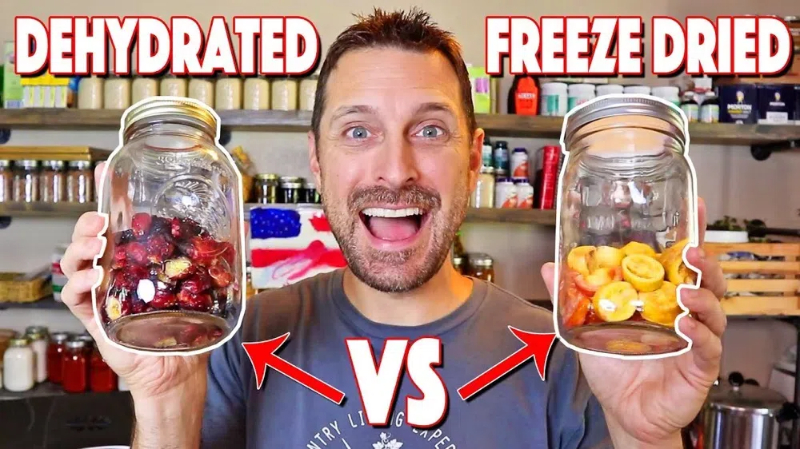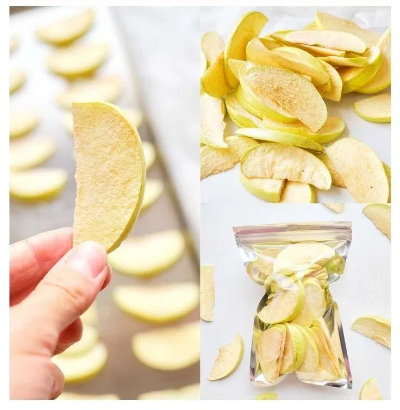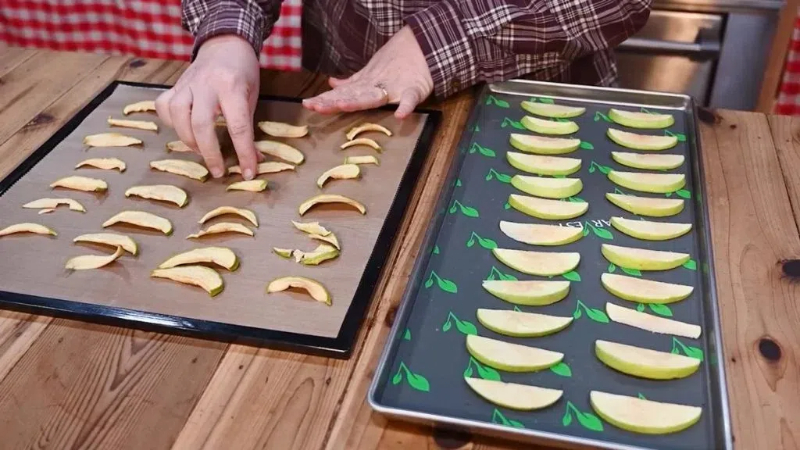
Content Menu
● Understanding the Basics
>> Food Dehydrator
>> Freeze Dryer
● The Processes Compared
● Nutritional Value Retention
● Texture and Flavor
● Cost Considerations
● Ideal Uses for Each Method
● Additional Benefits of Food Dehydrators
● Additional Benefits of Freeze Dryers
● Conclusion
● FAQ
>> 1. Is freeze-drying better than dehydrating?
>> 2. Can I use a dehydrator for freeze-drying?
>> 3. How long do freeze-dried foods last?
>> 4. What types of food are best suited for each method?
>> 5. Are there any maintenance requirements for these machines?
● Citations:
Food preservation techniques have evolved significantly over the years, with two of the most popular methods being food dehydrating and freeze drying. Both methods aim to extend the shelf life of food by removing moisture, but they do so in fundamentally different ways. This article explores the differences between food dehydrators and freeze dryers, their processes, benefits, and ideal applications.

Understanding the Basics
Food Dehydrator
A food dehydrator is a kitchen appliance that uses heat and airflow to remove moisture from food. The process involves placing sliced fruits, vegetables, or meats on trays within the dehydrator. The machine circulates warm air around the food, evaporating moisture over several hours.
- Temperature Range: Typically operates between 90°F to 160°F (32°C to 71°C).
- Moisture Removal: Removes about 70% to 90% of moisture.
- Shelf Life: Dehydrated foods can last anywhere from several months to a year, depending on storage conditions.
Freeze Dryer
A freeze dryer, on the other hand, uses a more complex process involving freezing and sublimation. The food is first frozen at extremely low temperatures (often around -40°F or -40°C). Once frozen, a vacuum is applied to lower the pressure around the food, allowing the ice to transition directly from solid to vapor without becoming liquid—a process known as sublimation.
- Temperature Range: Initially freezes food at subzero temperatures before gradually warming it in a vacuum.
- Moisture Removal: Can remove up to 99% of moisture.
- Shelf Life: Freeze-dried foods can last between 15 to 25 years or more when stored properly.
The Processes Compared
To understand how these two methods differ, let's break down their processes:
| Feature | Food Dehydrator | Freeze Dryer |
| Process Type | Heat and airflow | Freezing and sublimation |
| Initial Temperature | Moderate heat (90°F - 160°F) | Extremely low temperatures (-40°F) |
| Vacuum Use | No | Yes |
| Nutrient Retention | Moderate (60% - 75%) | High (up to 97%) |
| Texture Preservation | Changes texture (chewy or crunchy) | Maintains original texture |
| Energy Consumption | Lower energy use | Higher energy use due to complex machinery |
Nutritional Value Retention
One of the most significant differences between dehydrators and freeze dryers is how they affect the nutritional value of food.
- Dehydrators can cause some loss of heat-sensitive nutrients like vitamins A and C due to higher temperatures used during the drying process. Typically, dehydrated foods retain about 60% to 75% of their original nutrients.
- Freeze dryers, however, preserve about 97% of nutrients because the process avoids high temperatures that can degrade these sensitive compounds. This makes freeze-dried foods not only longer-lasting but also more nutritious compared to their dehydrated counterparts.
Texture and Flavor
The texture and flavor of preserved foods also vary significantly between these two methods:
- Foods dried in a dehydrator often become chewy or crunchy, which may not be suitable for all recipes. For instance, fruits like apples can turn into fruit leather or chips that are delicious but different from their fresh counterparts.
- In contrast, freeze-dried foods maintain their original shape and texture. When rehydrated, they closely resemble fresh foods in both taste and appearance. This makes freeze-dried fruits ideal for use in cereals or snacks where texture matters.

Cost Considerations
When considering which method to choose for food preservation, cost is an important factor:
- Dehydrators are generally much more affordable than freeze dryers. You can find decent models starting at around $50 to $100.
- Freeze dryers, however, are a significant investment. Prices typically range from $2,000 to $4,000 depending on the model and features.
Ideal Uses for Each Method
Choosing between a dehydrator and a freeze dryer depends largely on your intended use:
- Use a food dehydrator if you want to create snacks like jerky, fruit leathers, or dried herbs. It's perfect for short-term storage and everyday cooking needs.
- Opt for a freeze dryer if you plan on long-term storage of meals for emergencies or camping trips. It's particularly useful for preserving delicate items like strawberries or full meals that need to retain their original flavor and nutrition over many years.
Additional Benefits of Food Dehydrators
Using a food dehydrator has several advantages beyond just extending shelf life:
- Cost Savings: Dehydrating your own food can save you money by allowing you to buy seasonal produce in bulk and preserve it for later use. This reduces waste and helps you avoid purchasing expensive store-bought dried products.
- Healthier Snacks: Home-dehydrated foods are free from preservatives and additives commonly found in commercial snacks. You have full control over what goes into your snacks—whether it's pure fruit leathers or protein-rich jerky without added sugars or fillers.
- Versatile Applications: Beyond fruits and vegetables, dehydrators can be used for various culinary applications such as making yogurt, drying herbs for seasoning, or even creating unique snacks like kale chips or zucchini crisps.
Additional Benefits of Freeze Dryers
Freeze drying also offers unique advantages that make it appealing for certain applications:
- Lightweight Storage: Freeze-dried foods lose up to 90% of their weight due to moisture removal. This makes them ideal for situations where weight is critical—such as hiking expeditions or military rations—where every ounce counts.
- Convenience in Emergency Preparedness: Freeze-dried foods are excellent for emergency kits as they require no refrigeration and have an extended shelf life. They provide peace of mind knowing you have nutritious options available during emergencies.
- Applications Beyond Food Preservation: Freeze drying is also utilized in pharmaceuticals for preserving sensitive medications and vaccines that require stable storage conditions without refrigeration. This versatility showcases its importance across various industries beyond just culinary applications.
Conclusion
In summary, both food dehydrators and freeze dryers serve essential roles in food preservation but cater to different needs and preferences. Dehydrators are excellent for quick snacks and everyday cooking with a lower initial investment but come with limitations in terms of shelf life and nutrient retention. Freeze dryers offer superior preservation capabilities at a higher cost but are ideal for long-term storage solutions where maintaining flavor and nutrition is paramount.

FAQ
1. Is freeze-drying better than dehydrating?
Yes, freeze-drying retains more nutrients (up to 97%) compared to dehydrating (60%-75%). Freeze-dried foods also have a longer shelf life.
2. Can I use a dehydrator for freeze-drying?
No, a dehydrator cannot replicate the freeze-drying process as it does not involve freezing or vacuum conditions necessary for sublimation.
3. How long do freeze-dried foods last?
Freeze-dried foods can last anywhere from 15 to over 25 years when stored properly in airtight containers away from light and moisture.
4. What types of food are best suited for each method?
Dehydrators work well with fruits like apples and bananas, vegetables for soups, herbs, and jerky. Freeze dryers are better for fruits like strawberries and raspberries as well as complete meals.
5. Are there any maintenance requirements for these machines?
Dehydrators require minimal maintenance—just cleaning trays after use—while freeze dryers need regular maintenance on vacuum pumps and defrosting cycles after each batch.
Citations:
[1] https://www.webstaurantstore.com/guide/741/food-dehydrators-buying-guide.html
[2] https://sedpharma.com/news-events/what-is-a-freeze-dryer/
[3] https://www.lowes.com/n/buying-guide/freeze-dryer-vs-dehydrator
[4] https://www.bestbuy.com/discover-learn/10-reasons-to-buy-a-food-dehydrator/pcmcat1634332391134
[5] https://greenthumbdepot.com/blogs/guides/key-advantages-and-disadvantages-of-freeze-drying
[6] https://greenthumbdepot.com/blogs/guides/freeze-dryer-vs-dehydrator
[7] https://www.webmd.com/diet/dehydrating-food-good-for-you
[8] https://www.drawellanalytical.com/what-are-the-applications-of-freeze-dryers/
[9] https://www.commercialdehydrators.co.uk/post/freeze-drying-vs-dehydration
[10] https://candyjan.com/blogs/news/10-benefits-of-freeze-dried-food-you-didn-t-know-about
[11] https://brodandtaylor.com/pages/dehydrating
[12] https://www.healthline.com/nutrition/freeze-drying
[13] https://harvestright.com/freeze-drying-vs-dehydrating/
[14] https://www.healthline.com/nutrition/dehydrated-food
[15] https://www.mitchellcooper.co.uk/10-alternative-uses-for-dehydrators
[16] https://community.waring.com/blog/p/13or1/the-remarkable-benefits-of-adding-a-food-dehydrator-to-your-kitchen-arsenal
[17] https://sedpharma.com/news-events/freeze-dryer-vs-dehydrator/
[18] https://www.goodhousekeeping.com/appliances/a31904157/what-is-a-dehydrator/











